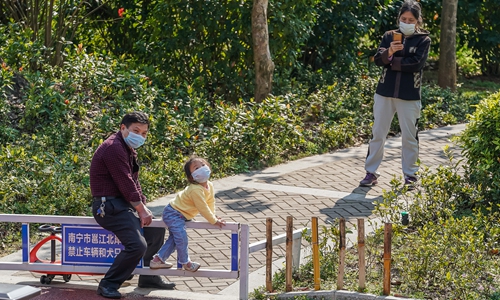HOME >> CHINA
Epidemic fosters bravery and modesty, dampens humor: study
Source:Global Times Published: 2020/2/26 17:07:22

A family relaxes at a local park in Nanning, South China's Guangxi Zhuang Autonomous Region on Monday. The COVID-19 epidemic keeps many people indoors while those who go out to enjoy the weather wear face masks. Photo: cnsphoto
While the COVID-19 epidemic has battered China, it has boosted Chinese people's good virtues, including bravery, self-discipline, modesty and civilian spirit, a recent study found. The study, conducted by the Positive Psychology Research Center of Tsinghua University's School of Social Sciences, shows that negative emotions have increased among people since the outbreak of the novel coronavirus. But in the meantime, people have paid more attention to the sense of accomplishment, engagement and the quest for life's meaning.
Ove the past month, the entire nation spent an exceptional Spring Festival extended holiday confined at home in order to reduce the chance of novel coronavirus infection.
After comparing data between 2019 and 2020, the researchers found that, except for humor, 10 out of the 24 character strengths are increasing during the epidemic — forgiveness, bravery, self-control, integrity, fairness, sense of humility, love of learning, teamwork, hope and kindness.
People's sense of happiness is composed of positive emotion, engagement, relationship, meaning, and accomplishment, said researchers. The study found that accomplishment, engagement and meaning have increased during the epidemic amid increasing negative emotion.
Experts said that the epidemic doesn't have much influence on relationships as internet provides more communication channels such as video chat and online games.
In the meantime, staying indoors allows people to have more time to focus on family life or self-improvement. Whether it's accompanying children or working in the frontline of fighting against the epidemic, engagement makes people happy.
People always assume death is far away, and tend to postpone important but not urgent things. Maybe it is when their life is at stake, that they see the valuable things, said experts.
The decreasing sense of humor during epidemic control is probably because of the decreasing positive emotions that help people make jokes.
The results also show that people would mobilize more psychological resources to make them more brave, self-disciplined, cooperative, easier to forgive, kinder and full of hope.
It is believed that disasters bring anxiety, fear, helplessness and panic. But the research shows that the epidemic has inspired more inner-power of people, boosted cooperation among strangers, and made people to be kind and willing to help others, which brings hope to overcome difficulties.
RELATED ARTICLES:
Posted in: SOCIETY